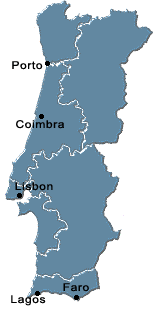Inept right sends Portugal left
Portuguese Communist Party and Left Block increase vote
Three years of government by the centre-right and conservative coalition government formed by the PSD (Social Democrats) and CDS/PP (Conservatives) was enough to send the Portuguese to the ballot boxes to deposit their faith in the hands of the Socialists, led by Jose Socrates.
To note, the Communist Party (PCP) which, together with the Ecological Green Party forms the Unitary Democratic Coalition (CDU) saw its vote increase for the first time since 1985 and the Left Block, a coalition of various leftist formations, saw its number of MPs increase almost threefold, from 3 to 8.
However the clear winner is the Socialist Party (PS), which gains an absolute majority for the first time in its history.
The PS received 45.05% of the vote and 120 of the 230 seats in Parliament; second was the PSD with 28.69% and 72 MPs; the CDU was third, with 7.57% and 14 MPs, an increase of two since the last election in 2002, fourth was the CDS/PP with 7.26% and 12 MPs and lastly, the Left Block with 6.38% and 8 MPs. There are 4 places to be allocated to the MPs elected by the Portuguese emigrants.
Around half a million votes went directly to the PS from the PSD, with a remaining 40,000 going to the Left Block, while this party also gained around 60,000 votes from the CDS/PP, these being voters who did not support their leader, Paulo Portas, and understood that voting for the Left Block would take the absolute majority away from the Socialists.
While it is true that the E.U. convergence criteria, which force Portugal to limit its deficit to 3% of its GDP, hampering any margin of movement, it is also true that the policies adopted by the Social Democrats and Conservatives were perceived as wholly inadequate. The unemployment doubled in three years, breaking through the 7% barrier and in Portugal, the public finances are in such a chaotic state that some families had to wait up to seven months for the first payment from the unemployment benefit. Unbelievable, but true.
The burden was too hard for the Portuguese people to bear, at a time when the adoption of the Euro saw a sharp increase in prices, while a salary contention process has meant that practically all members of society are in real terms earning less than five years ago.
The Prime Minister, Pedro Santana Lopes, took the courageous decision to fight the election with the slogan "Against Winds and Tides" (one against everyone) leaving his party the chance to lay the blame squarely on his shoulders, choose another leader and move forward. He already assumed total responsibility for the defeat and has convoked a new Party Congress.
His partner in the government, ex-Defence Minister Paulo Portas, leader of the CDS/PP, has resigned as President of the party, yet it is not clear yet who will accept the post - if anyone, because with Paulo Portas in the shadows with his cloak on and his dagger raised, nobody's back is safe.
In fact the problem was not Santana Lopes - he inherited a chaotic situation from the former Prime Minister, Jose Barroso, who took the first opportunity to leave a post for which he was not cut out and bolt for Brussels.
The political right in Portugal once again adopted laboratory policies which appeared good on paper to generations of managers spewed forth onto the work market every year but whose grasp of the real problems of the Portuguese is close to zero - because the political class belonging to the right-wing parties has never lived a single day in the life of the average citizen.
In a country where there is a substantial section of the population receiving wages of under 400 Euros per month, and in which supermarket prices are far higher than Spain, or even the UK, and where the average salary is around 610 Euros per month (and average pensions around 350), there are families, in the European Union, who have to perform considerable economic gymnastics just to put food on the table every day - a right which in the rest of Europe is a foregone conclusion.
With an absolute majority, the responsibility lies with the Socialist Party to govern the country out of its deepest economic and social crisis in living memory. If they do not succeed, it can be concluded that neither of the two main parties is adequate for the task - and the vote in the leftist parties can only go up and up, because there is nowhere else to go.
Should this be the case, it remains to be seen whether Portugal has the conditions to be inside the Euro zone and whether it has the capacity to fulfill the convergence criteria.
Subscribe to Pravda.Ru Telegram channel, Facebook, RSS!





